lancer
Posts: 2963
Joined: 10/18/2005
Status: offline

|
.
Staff Officer Briefing - Command
You don’t need to remember any of the details ‘cause the mod will provide you with a one-stop report at the beginning of each turn that summaries all there is to know, officer wise. It’s called the ‘Staff Officer Briefing – Command’.
It is, I’m afraid, dense. In my defence I’m working with a limited palette of formatting options. Once you get your head around it, though, it’s easy to deal with and very useful. It’s also, like a lot of other mod reports, dynamic. Only the bits that are relevant will pop-up, all the non important stuff will remain hidden.
We’ll ease into it with our mate, Kalil, whom we met previously.
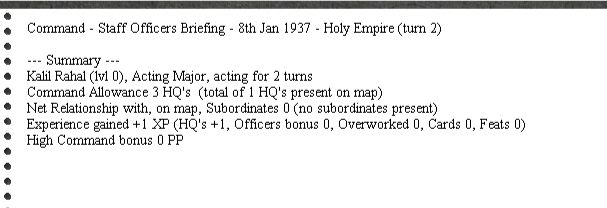
The ‘Summary’ section gives all the really important stuff. You can skip the rest but take a moment to read the summary.
The first line tells us who our CIC is (Kalil), his level (‘0’), his rank (‘Acting Major’) and how long he has been on the job (2 turns).
The second tells you all about his Command Allowance. Take a note and we’ll get to that shortly.
The third line tells you his overall relationship with his subordinates which, in this case, are zero because he is the only officer currently on the map. I think I must have given Faisal and his partner in crime a kick up the bum as they went out the door the previous turn.
Line four is all about the XP that Kalil has gained from his arduous job at the top. He will earn 1 XP for every HQ he commands, including his own, up to his command allowance. As there is only the Supreme HQ currently on the map he gets a grand total of 1 XP.
There are a few other factors influencing this within the brackets. ‘Officers bonus’ gives another + 1 XP for every subordinate he has but only if they have a good relationship (>0) and also if the overall net relationship he has with all his subordinates is positive. Kalil, as a lowly Acting Major, could potentially earn 3 XP’s from HQ’s and another 2 XP’s from happy subordinates. That’s 5 XP a turn and the fast track to promotion.
There’s something called ‘overworked’. We’ll cover that when I talk about Command Allowances but basically if your CIC takes on too big a workload he’ll suffer penalties.
‘Cards’ are the XP’s you gain from playing action cards. These can range from 10 XP up to 30 XP with the amount being in proportion to the risk of an accident. ‘Feats’ refer to a few special feats that a CIC can gain which can affect their XP’s.
The last line refers to the bonus PP’s available from High Command. As this is only possible if there is a overall positive relationship with all of the CIC’s subordinates it isn’t applicable here for Kalil.
Alrighty, lets have a look at another report, this one with more things going on.
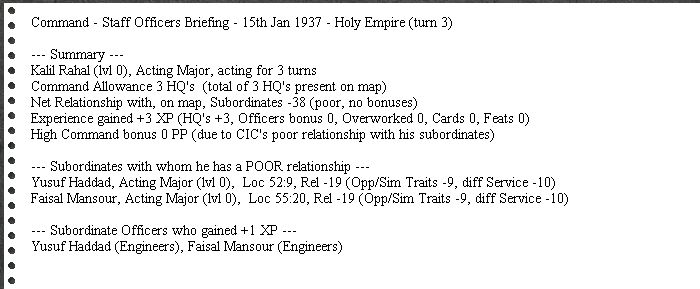
This is Kalil but on the following turn from the report above. Looking at the summary you can see that there are now three HQ’s on the map and Kalil has pulled in 3 XP’s as a result.
His net relationship with his subordinates has sunk to a low of -38 and the reason can be seen in the section of the report called ‘--- Subordinates with whom he has a POOR relationship ---‘. This gives you a very useful summary of who isn’t getting along, where they are and why. There is a similar section that shows GOOD relationships.
Using these two sections you can figure out what’s going on, relationship wise, without having to individually check each and every officer (if you want to drill down into specific details such as which are their conflicting traits, you’ll have to check the officer pop-ups).
Why isn’t Kalil not getting along with his subordinates? Because Failsal, the wimpy lisper, has returned to haunt him and has brought along his best mate ,Yusuf. Both of them resent Kalil (because he’s an Artillery officer from the Army service and they are both are Engineers from the Support service). Additionally they both have personal issues with Kalil, who happens to be a nice bloke and would indicate that they are both deadbeats.
There’s a lesson here. Don’t drink wine and cook dinner while fighting a war. I fired both these dills on turn two and somehow gave them their commands back on turn three. Duh!
The other section of the report (‘--- Subordinate Officers who gained +1 XP ---‘) shows who amongst your subordinates gained a point of experience this turn. Both the dills did. Normally this wouldn’t happen as only subordinates with a good relationship score here but ‘cause they are both from non-Army services they get to sneak over the line (the mod adds a temporary +40 points to their relationship and if it gets them over the zero line they qualify).
Here’s another, yet more involved report.
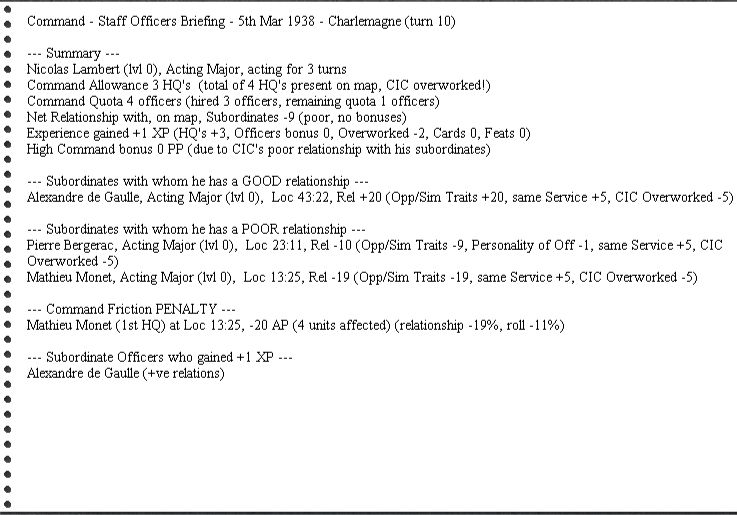
This time we are dealing with Nicolas, who hails from Paris, chomps croissants and likes mouldy cheeses served by buxom wenches.
Nick’s doing O.K, although he is a little stressed. Notice that he is responsible for 4 HQ’s which is one more than he can confidently handle as an Acting Major. There is, on the line detailing his XP gain, a -2 XP penalty for being ‘overworked’. You’ll also notice that for each of his subordinates there is a -5 relationship penalty for the same reason.
Nick’s, with all the daily hassles he has to deal with, is a tad testy and it’s starting to show. If he hadn’t taken on that one extra HQ he would have had much better relations all around.
The sharp of eye might also notice a new line in the ‘Summary’ section. ‘Command Quota’. This only appears if you are playing with the ‘Realistic Officers’ option. You can see that Nick can recruit four officers and he has already hired 3. This ‘quota’ will increase in line with his promotions.
Down near the bottom is a new section , ‘--- Command Friction PENALTY ---‘. Each and every subordinate officer is tested against a random roll each turn and if the roll is less than their relationship level they receive a BONUS (+20 AP) in the case of a +ve relationship and a PENALTY (-20 AP) in the case of a –ve one.
In this instance the subordinate, Mathieu has a -19% relationship level and rolled a -11 giving all attached units a -20 AP penalty. Tough break for Mathieu and his men but he’s getting a bit fed up with Nicolas being tetchy with him (‘overworked’ penalty) and they are chalk and cheese (opposite traits) so you’d have to expect that there will be some misunderstandings occasionally.
Command Allowance
Your CIC aren’t supermen. You can’t expect them to step into the hot seat and effectively command vast numbers of HQ’s from the get go. Doesn’t work like that. There is a limit. They have to gradually grow into the job.
A CIC can command a number of HQ’s equal to his level + 3. Starting out at level 0, this gives an allowance of 3 HQ’s, inclusive of the CIC’s own HQ.
The type of HQ doesn’t matter – one with an officer or one without – it’s all the same. Take on too many HQ’s and your CIC will suffer steep penalties in terms of XP and relationships. Your CIC is considered to have too much on his plate and is becoming increasingly stressed.
The allowance is the same regardless of whether you are playing with a one town start or a pre-generated empire. Game wise you can no longer spam HQ’s around the map. Where you place an HQ becomes important as they are now rarer commodities. There is also a significant benefit to nurturing your CIC into the higher ranks.
One trap that’s easy to fall into is where you find that your CIC is suffering from the ‘overworked’ penalty. You take decisive action to resolve the situation and fire a couple of officers in order to get your CIC back within his Command Allowance. Next turn you find that nothing has changed, he is still overworked!
What’s happened here is that he is still commanding the same number of HQ’s, only a couple of them don’t have officers anymore. It’s the number of HQ’s that count, not the officers.
Realistic Officers Option
A CIC can only recruit so many officers. In real life you don't get to have an endless stream of potential candidates to pick from. You have to work with what you've got, within reason.
The amount (‘quota’) of officers your CIC can recruit is shown in the report and increases every time your CIC is promoted. Any time you recruit an officer, regardless of whether you give him a command on the map or place him in your officer pool, he uses up one of your available quota.
There is nothing to stop you recruiting more officers beyond your quota. Nothing but the fact that the PP cost for each subsequent officer will double. And keep doubling. This is permanent and can’t be undone by firing officers.
Note: The internal workings of the engine make it difficult for me to provide a warning message when you reach your limit but you get an update with your Staff Officer Briefing each turn and you can easily see the PP cost of any new officer you are about to recruit. Like Harry Callahan, you have to keep count of your bullets.
Also note that any officers already on the map at game start are considered to be ‘free’ and don’t count against your quota.
This option is all about officers as a scarce and valuable commodity. The challenge is managing your officers to get the best out of what’s available. You’ll never have what you want and you’ll be forced into making comprises. Good officers become even more valuable by virtue of their rarity and you need to think long and hard before putting them in harms way.
Firing an officer, even a really bad one, is a tough decision as you will likely need them in the future as they may be all you’ve got left after losing a couple to the hospital and a few more to the graveyard. Once again, if you can manage to promote your CIC to a reasonably high rank you’ll have a much wider choice of officers as your quota will have increased.
Tick this option and your are effectively stepping into the shoes of any famous WW2 commander that you care to name. They didn’t get to change out all the key officers in a new command. They were given some latitude but were expected to make the most of the human resources on hand. Man management was just as important as military aptitude.
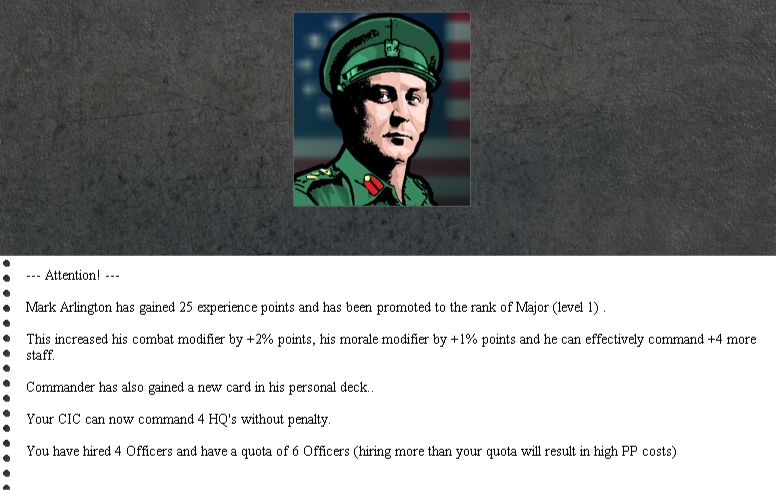
Our CIC obtains his first promotion along with much needed increased capabilities. More HQ’s and more Officers.
Relationships – the Nuts and Bolts
Relationships work on a -100 to a +100 scale with ‘0’ being considered normal, or ‘neutral’. They are dynamic and can change from turn to turn. The core relationship drivers will remain constant but factors such as promotions, overwork etc. can create a sudden shift. The officers pop-up descriptions are dynamically updated prior to each turn to reflect any changes.
The following factors can influence relationships
• Opposite or Similar traits (between your CIC and the Subordinate)
• Special relationship specific traits (from your CIC, your Subordinate or both)
• Differences in Rank (between your CIC and Subordinate)
• Services (same or different between your CIC and Subordinate)
• Overwork penalties (derived from your CIC exceeding his Command Allowance)
Opposite or Similar Traits
Each officer has three key stats, their Combat and Morale modifiers and their Staff rating. They can have traits that affect each of these three areas. The way the mod works an officer has a percentage chance of having a trait in a particular area (it varies depending on the area but the three key stats are 60% odds for a trait in each).
Provided this roll hits they are given a random trait from the relevant table, eg. there is a table of available ‘Staff’ traits, ‘Morale’ traits, etc. There are over 100 different traits and each has either a positive or negative effect on the officers relevant stat.
Traits also have a ‘rating’ which determines how many dice to roll to obtain a strength for that trait. You may have two officers with an identical trait but one might be ‘Energetic +6’ and the other ‘Energetic +18’. What’s happened is that the Energetic trait rating says roll ‘x’ amount of 1d10 and add them up to get the strength.
This will vary each time but traits with hefty ratings are more likely to result in higher strength ratings than those with lower ratings.
Any traits that refer to the three key officer stats can result in relationship modifiers as those of your CIC interact with your subordinates.
How?
I've modelled human relations to a high degree of depth and sophistication in the mod. I'll try to not embarrass anyone by using too many big words explaining it all. Who can spell Psychology?
I'm joking. It's a very simple model. The good guys (those with positive traits) are drawn to the other good guys. The *ssholes and incompetents (those with negative traits) prefer to be with the other *ssholes. Mix a good guy with an *sshole and sparks start to fly.
Anyone who is neutral (traits in that area set to '0') doesn't have sufficiently strong feelings one way or another to make a difference. It's only where you have obvious conflicts (opposite signed traits) or similarities (like signed traits) that there is a relational impact.
An even simpler way to describe it is that ‘opposites repel and like attract’.
The mathy part is that the relationship effect is equal to the average of the two trait strengths. Let’s take a couple of combat traits for an example.
Say your CIC has the ‘Decisive +8 (com)’ trait and your Subordinate has the ‘Armchair General -6 (com)’ trait. Adding the two (ignoring the signs) gives you 14. Divide by 2 to average them out and you end up with a -7 hit to their relationship (they are opposite traits so the effect will be negative).
Pretty simple but there are interesting implications. Any officer with strongly defined traits, eg. ‘Coward -30 (mor)’, is going to create strong reactions by virtue of the strength of the trait. Mix them with somebody with a ‘Brave +20 (mor)’ trait and they’ll have a -25 relationship hit before any other factors are taken into account. They are unlikely to be friends.
The ideal CIC is one with no traits at all. He is neutral in all the three key areas and as such doesn’t endear much in the way of loyalty but conversely doesn’t generate any ill will. He just is. People will work with him. They might mutter behind his back that he is Mr Dull but that won’t stop them working effectively and efficiently with him.
You’ll find that most officers are a mixture of qualities. There are very few true saints and equally few outright sinners but you can be surprised. The random generation routines can throw out some truly unique and memorable individuals.
Special Relationship Traits
There exists a ‘Special’ table. When officers are being germinated they need to roll a pretty low number in order to be assigned a trait from this table. They are ‘special’ for a reason. You’ll recognise them by the ‘(rel)’ indicator in the officer pop-up.
This tells you that this particular trait acts as a global relationship modifier all on its own. It can’t be offset by opposing or similar traits. It’s a constant drag. There’s a reason people don’t like working with someone who is, for example, ‘Schizophrenic -9 (rel)’.
For those of you who doubt that such qualities would exist in ranking WW2 officers I can only recommend a book that I’ve just finished reading, ‘Crete’ by Anthony Beevor. Great read and the reason I’ve included the ‘special’ traits. I managed to populate my special trait table with descriptors from actual real life military figures in the book. Mind boggling.
Differences in Rank
Your CIC doesn’t care what rank his subordinates are. He’s the man in charge so it’s irrelevant to him as everybody will do as he asks regardless of petty ranks.
Not so with his subordinates. A higher ranked subordinate officer, than your CIC will harbour a strong streak of resentment at having to answer to a lower ranked officer. This will result in relationship penalties commensurate with their difference in their ranks.
Normally your CIC, because of the design of the XP system within the mod, will be at a higher rank than his subordinates. But what happens if you have to replace him with a newly minted junior? All those subordinates with a higher rank will not take kindly to being overlooked for the big job. Depending on the relative differences in rank they could be very unhappy indeed.
So where does that leave you? Have you got an understudy officer in your ranks who you have been carefully mentoring up through the ranks in expectation of this very moment? Bet you don't.
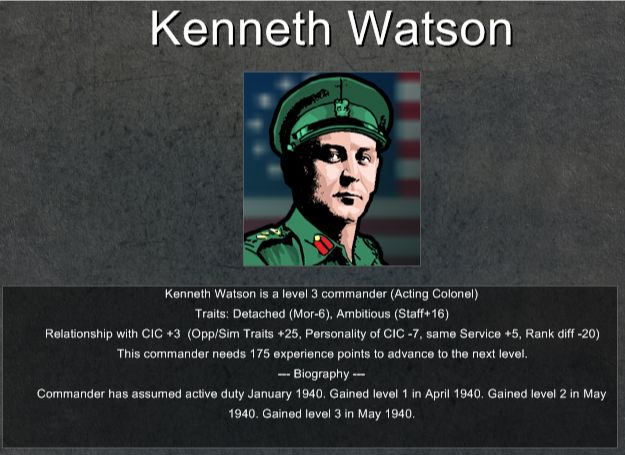
Kenny has been doing the hard yards holding down our western front. Tough job.. As a result he’s gained a lot of combat experience and is now an Acting Colonel, a higher rank than our CIC, Mark Arlington from above. Their previously excellent relationship is now lukewarm as Kenny starts to get ideas above his station. Kenny is on the verge of needing a cold shower.
Differences in Services
Rivalry between the different services is alive and well in the mod. The different types of officers and their respective services are as follows;
Army Service
• Infantry officer
• Armour officer
• Artillery officer
• Command officer
Air Force Service
• Air Force officer
Naval Service
• Naval officer
Support Service
• Engineer officer
• Logistical officer
• Intelligence officer
The rivalry is all one way. Once again it is the subordinates that will resent having a CIC from a different service. Like services generate warm fuzzy feelings but not to the same degree.
Action Cards and Feats
These aren’t fully fleshed out yet. They take a lot of time to test and I’ll add them in later but what’s here already is more than adequate.
As mentioned, an officer with specialised training will receive a card in his area of training. I’ll mention a few of the newer cards that I’ve added to accommodate the expanded range of officer types.
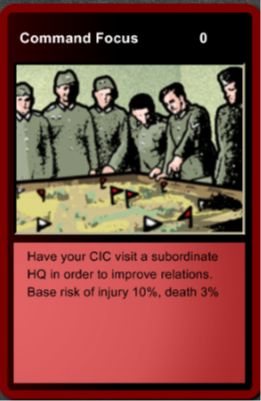
The base risks are now shown numerically for all action cards
Command Officers
Will get the ‘Command Focus’ card. This is a card that can only be used by your officer if he is currently your CIC. It can be played on any subordinate officer and raises their relationship level by +20. You CIC is, in effect, making an impromptu field visit to the relevant HQ in order to pin a medal to their chest or reprimand them, depending on their current relationship level.
Either way their relationship improves significantly and the effect will only gradually wear off. You can use this card to pull into line a recalcitrant officer (Failsal, I’m looking at you…) or improve an already good relationship so that the subordinate has a greater chance of gaining the +20 AP bonus for his attached units. It can be played multiple times on the same subordinate and is a powerful management tool available to your CIC.
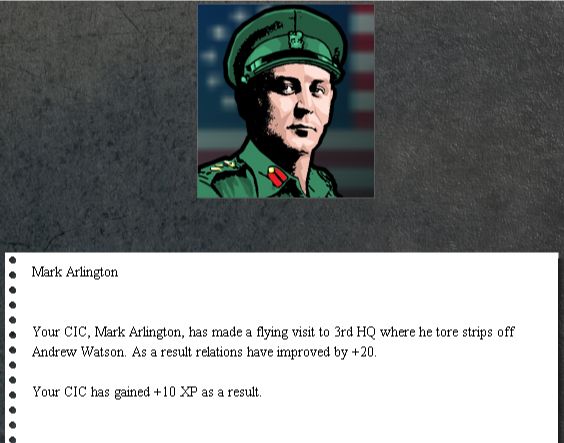
CIC, Major Mark, taking of business. The relationship boost with Acting Major Andrew (currently in charge of our Air Force) will gradually wind down once Major Mark has gone back home but the effect will still be lingering four or five turns later. Look at that steely eyed stare and the superior tilt of the chin. Takes years of careful breeding to get a face like that. Don’t mess with Major Mark.
Air Force Officers
Gain the ‘Tune Up’ card which gives a combat bonus to air units, prior to them taking off. It works with both fighters and bombers.
Naval Officers
Gain the ‘Work Up’ card which allows them to improve the experience of a naval unit currently in port. While this doesn’t sound like a big deal it actually is as newly built naval units arrive with 10 XP and, if sent to sea in this state, will be chewed up by the AI in short order.
Another aspect of Naval officers is if they gain the +20 XP bonus, from having a good relationship with their CIC, the bonus applies to ALL attached units, regardless of their distance from the HQ.
In every other cases (any other non-Navy officer) the +20 AP bonus only applies to attached units that have an HQPWR (HQ power rating) of more than zero, eg. if the unit is too far from it’s HQ it misses out on the bonus.
Logistical Officers
Have the ‘Supply Dump’ card. This is really useful and enables them to establish a supply dump (variable number of supplies depending on rank and a random roll but a worthwhile amount) at any HQ within a certain range from themselves (20 hexes? It says on the card). They can do this to HQ’s even if they are isolated or across the other side of an ocean.
Intelligence Officers
My favourite. They have the ‘ULTRA’ card. Remember Ultra intelligence intercepts in WW2? An intelligence officer playing this card can pick any enemy hex and see what’s there. Want to know what enemy forces are in that city you’re about to invade?
Engineering Officers
They get the standard ‘Fortify’ card.
General Advice for Action Cards
There is another trait that I haven’t yet mention, ‘risk’. Action cards display the base risk of injury or death that the officer is exposed to when carrying out whatever task is required by the card. This base risk is modified by rank (the higher your rank the less the risk) and by any ‘risk’ trait that you officer may have, eg. ‘Myopic + 6 (risk)’.
The risks are further modified by any relevant feats. All these details are shown in the event of an ‘incident’.
The general rule of thumb that holds good for just about every action card is that the higher the officer’s rank (or level), the less the risk and the more effective they will be in carrying out the task.
Playing action cards is also an excellent way to gain big dollops of experience although this needs to be tempered by the chance of injury or death.
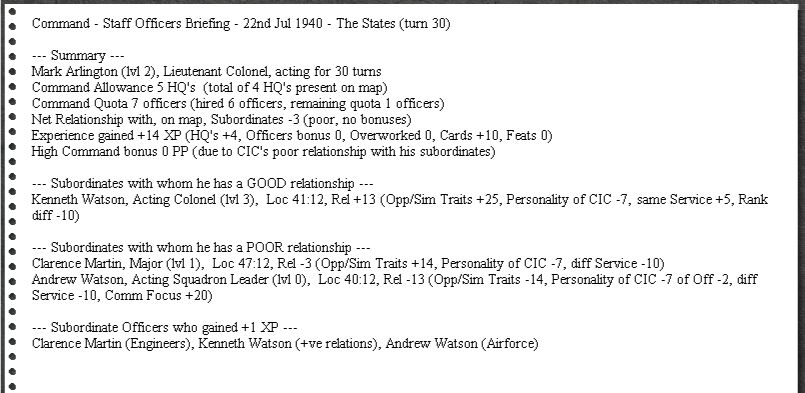
CIC Mark, now Lieutenant Colonel is still having trouble with Andrew Watson. Another visit might be in order. Clarence could do with a kick up the bum at the same time although Andrew is the real fly in the ointment. Note that CIC Mark, by exercising his Command muscle, has pulled in +14 XP this turn.
< Message edited by lancer -- 5/13/2013 9:47:54 AM >
|
 Printable Version
Printable Version






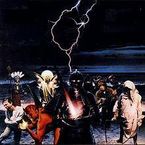
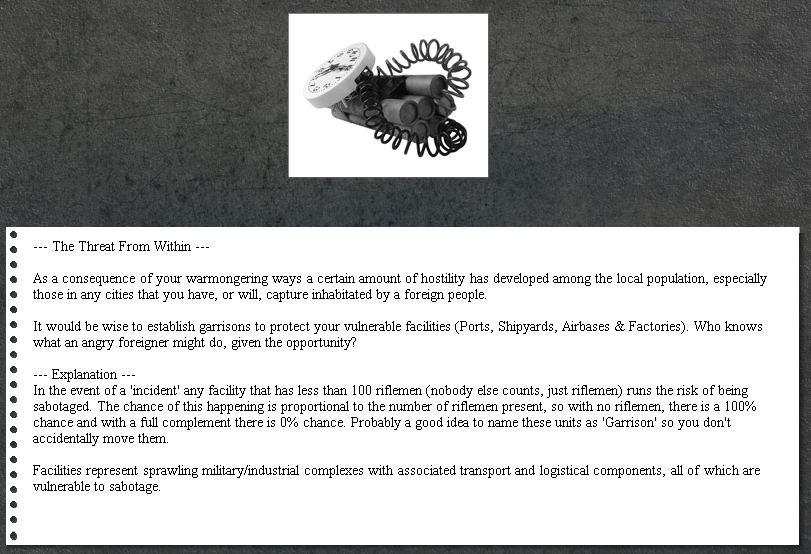
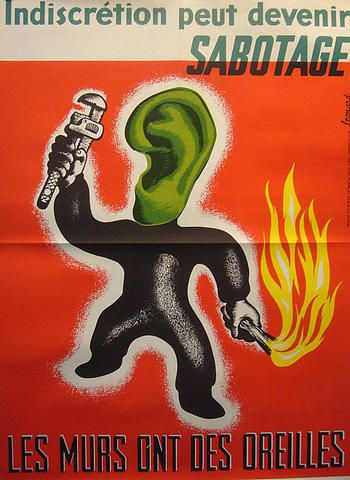
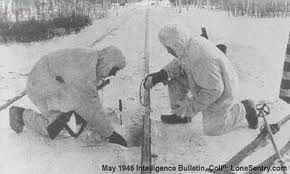
 that big countries have many factories/ports so it will require more rifles to protect them.
that big countries have many factories/ports so it will require more rifles to protect them.

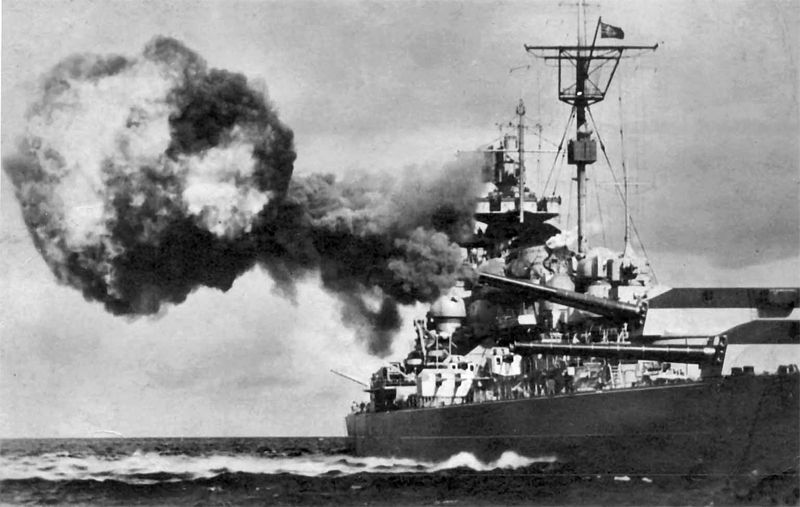
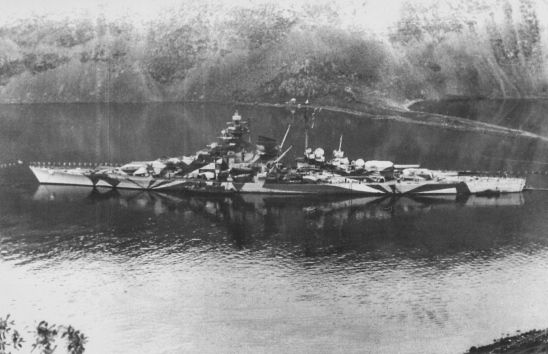
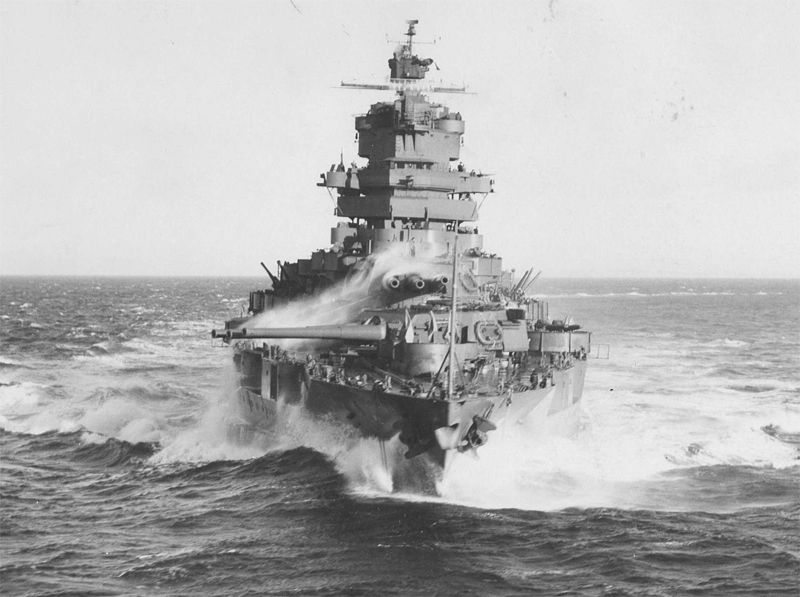

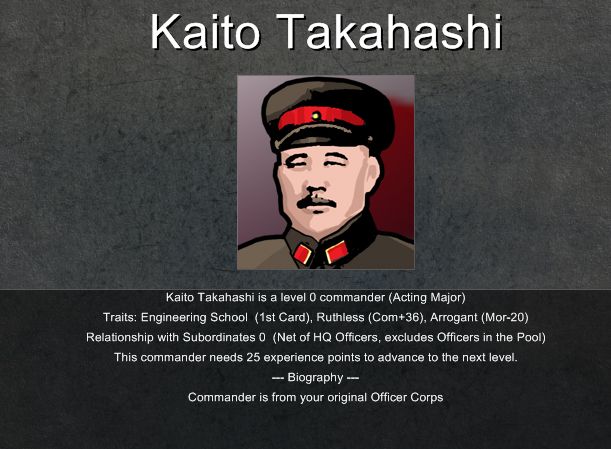
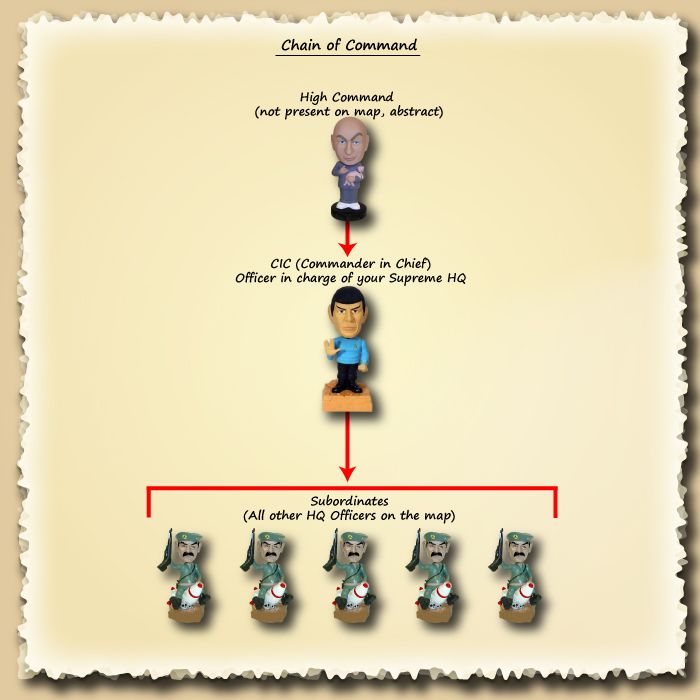
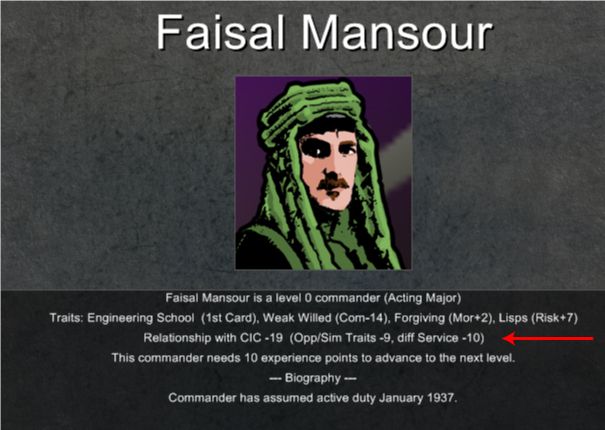
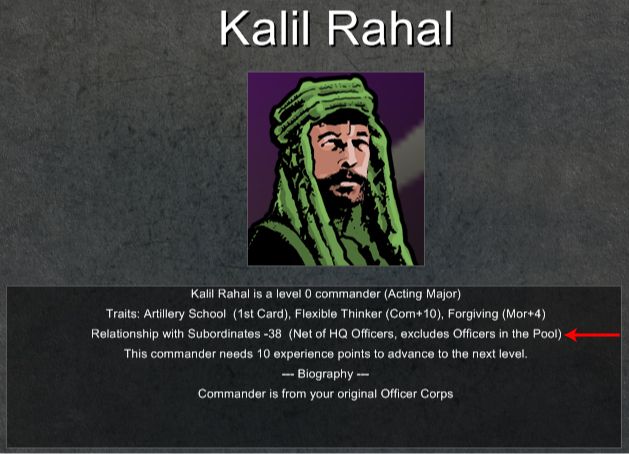
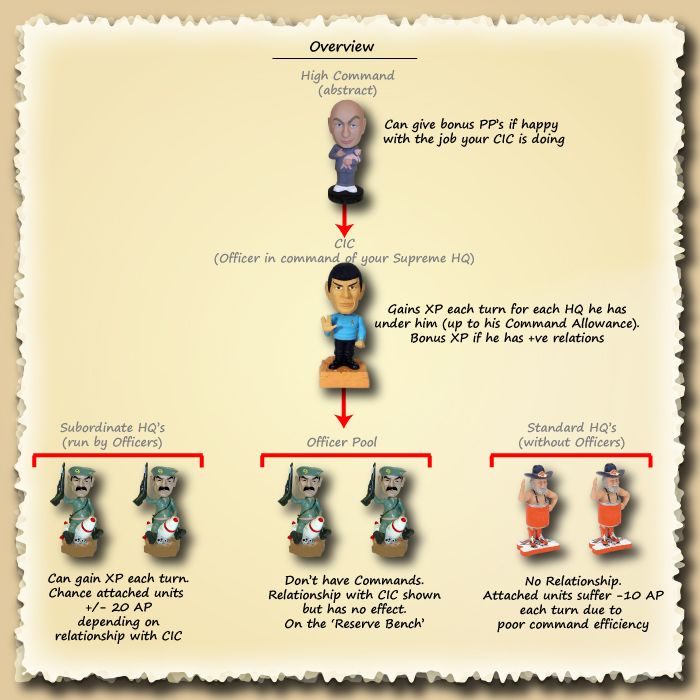
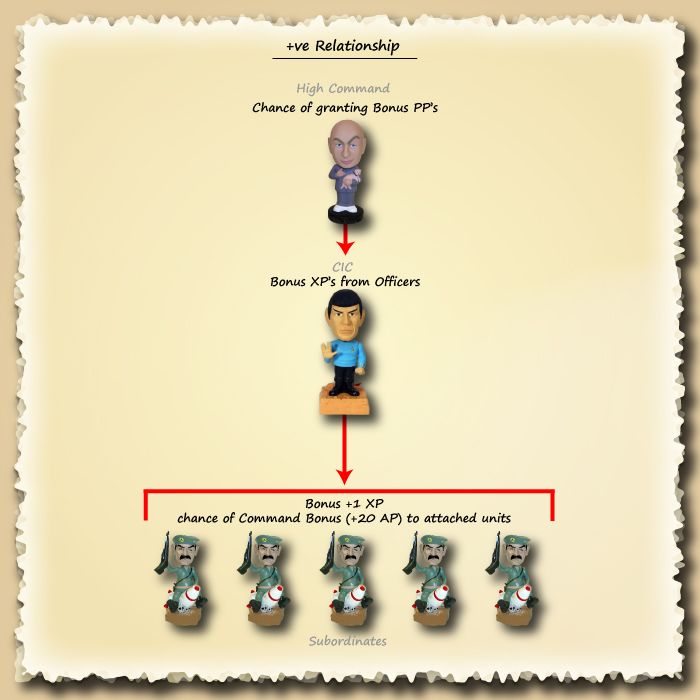
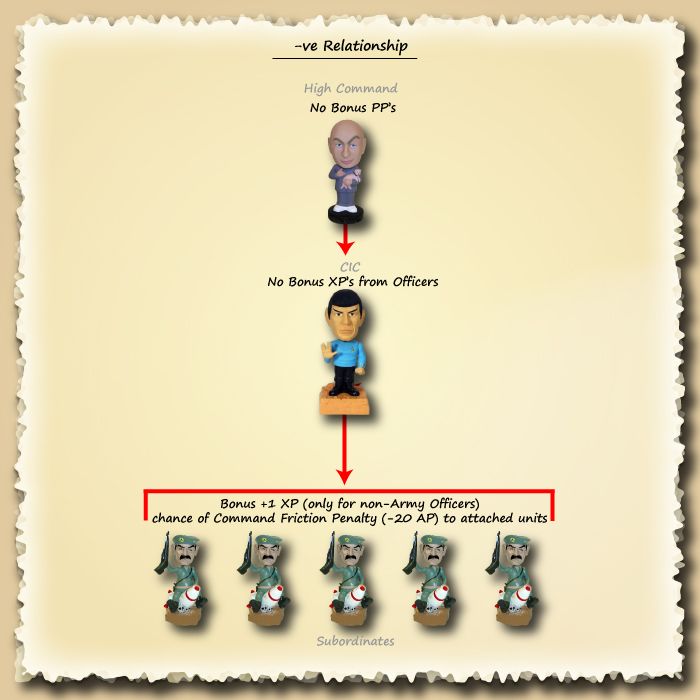








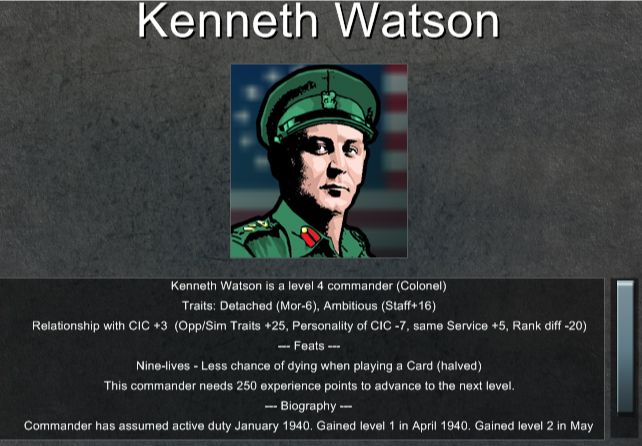
 Those officers add soul and a new dimension to ATG. Every game will be totally different.
Those officers add soul and a new dimension to ATG. Every game will be totally different. 

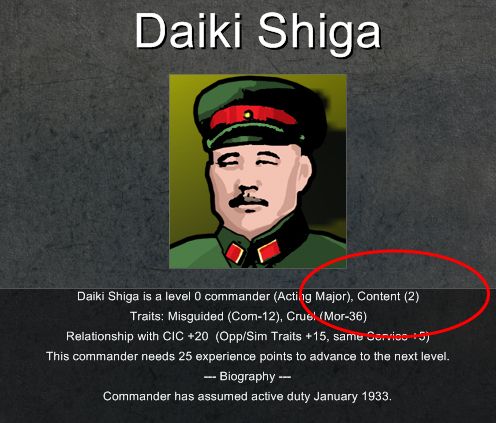
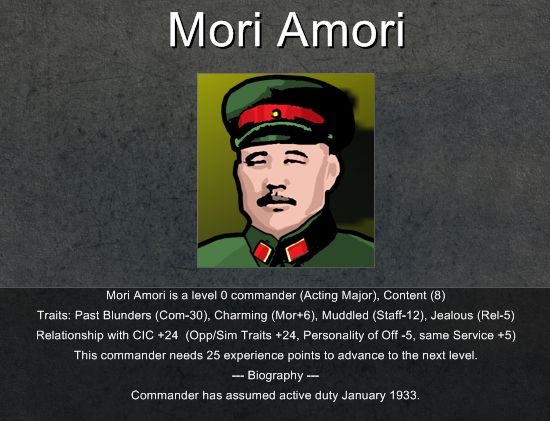
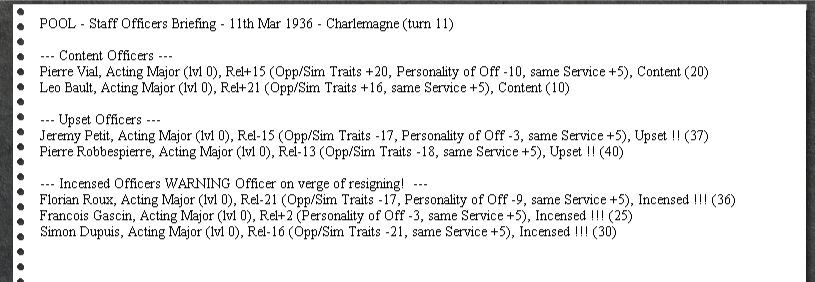
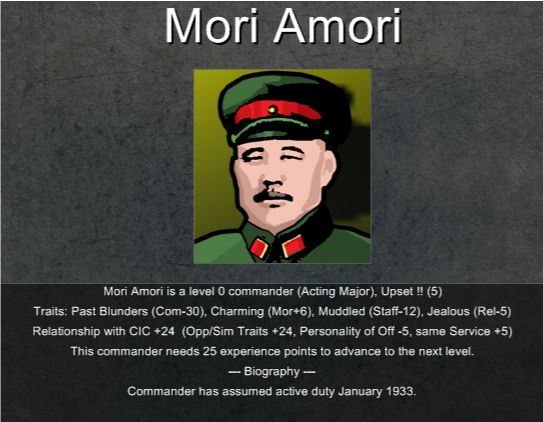

 New Messages
New Messages No New Messages
No New Messages Hot Topic w/ New Messages
Hot Topic w/ New Messages Hot Topic w/o New Messages
Hot Topic w/o New Messages Locked w/ New Messages
Locked w/ New Messages Locked w/o New Messages
Locked w/o New Messages Post New Thread
Post New Thread